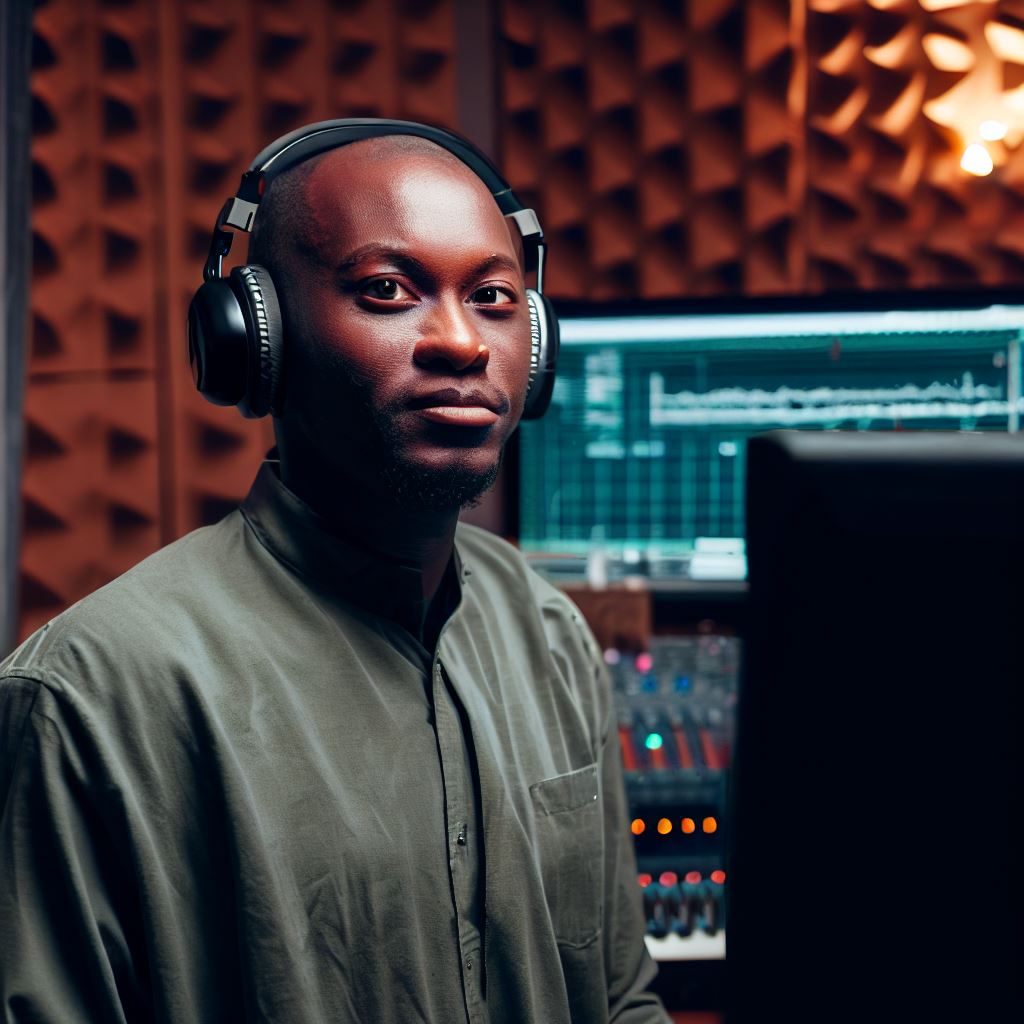Introduction
Becoming a sound engineer in Nigeria is an exciting and important career choice. Sound engineering plays a vital role in various industries, including music, film, television, and live events.
With the entertainment industry in Nigeria experiencing rapid growth and development, the demand for skilled sound engineers is on the rise.
Professionals in this field are needed to ensure high-quality sound production and provide immersive audio experiences.
As the music scene in Nigeria continues to thrive, sound engineers are in high demand to create and mix music tracks.
They help artists and producers achieve the desired sound, making sure every instrument and vocal is perfectly balanced.
The film and television industry also heavily rely on sound engineers to enhance the viewer’s experience.
They work on location and in post-production, ensuring that sound effects, dialogues, and background music are clear and impactful.
Moreover, the demand for sound engineers is increasing in the live events sector.
From concerts to corporate events, sound engineers are instrumental in delivering impeccable audio quality to large audiences, ensuring every word and note is heard flawlessly.
As technology continues to advance, the importance of sound engineering in Nigeria will continue to grow.
Whether it is recording, mixing, or mastering, sound engineers contribute to the overall production value of various industries and play a crucial role in delivering exceptional audio experiences.
Understand the Role of a Sound Engineer
A. The responsibilities and duties of a sound engineer
A sound engineer is a professional responsible for the technical aspects of sound during various events.
Sound engineers are responsible for operating and maintaining sound equipment during live performances, recordings, and broadcasts.
They set up and operate sound equipment such as microphones, soundboards, amplifiers, and speakers.
Sound engineers also troubleshoot technical issues, ensuring that sound is of high quality and free from distortions.
In the music industry, sound engineers work closely with musicians, producers, and record labels to achieve the desired sound.
They help in the recording, mixing, and mastering processes, ensuring that the audio quality is top-notch.
Sound engineers also play a crucial role in live events such as concerts, festivals, and shows.
They are responsible for setting up sound systems, coordinating stage sound during performances, and maintaining the audio clarity.
Sound engineers in the film industry work on the sound design and post-production aspects of movies.
Transform Your Career in Nigeria
Discover unmatched expertise with our personalized Career Consulting service. Navigate Nigeria’s job market with a strategy tailored just for you.
Get StartedThey collaborate with directors, editors, and composers to create the perfect audio atmosphere for films.
They are responsible for recording dialogues, adding sound effects, and mixing audio tracks.
In the broadcasting industry, sound engineers ensure the smooth running of radio and television programs.
They oversee live broadcasts, operate sound equipment, and monitor audio levels to provide a seamless listening experience.
Sound engineers also work in the gaming industry, creating realistic and immersive soundscapes for video games.
They add sound effects, design audio interfaces, and implement surround sound to enhance players’ experiences.
B. Steps to become a sound engineer in Nigeria
To become a sound engineer in Nigeria, one must have a strong passion for sound and music.
Having a background in physics, electronics, or music technology can be beneficial.
It is essential to acquire relevant technical skills and knowledge by enrolling in sound engineering courses or programs.
Getting hands-on experience through internships or working with experienced sound engineers is also crucial.
Building a portfolio of successful projects and networking with professionals in the industry can help advance one’s career.
C. The different industries where sound engineers are required (music, film, live events, etc.)
Sound engineers are in demand across various industries, including music, film, live events, broadcasting, and gaming.
They play a vital role in ensuring that the sound quality is of the highest standard, enhancing the overall experience for audiences.
Becoming a sound engineer in Nigeria requires dedication, continuous learning, and a genuine love for creating exceptional audio.
Read: Sommelier Events in Nigeria: Networking and Learning
Develop Required Skills and Knowledge
In order to become a sound engineer in Nigeria, it is crucial to develop the necessary skills and knowledge.
Here are some key areas to focus on:
- Learn audio recording, editing, mixing, and mastering techniques.
- Understand the operation of different sound equipment and their functions.
- Acquire knowledge of music theory, acoustics, and signal processing.
Developing these skills and knowledge will greatly enhance your ability to succeed as a sound engineer.
A. The technical skills needed
As a sound engineer, it is essential to possess strong technical skills to effectively work with audio.
These technical skills include:
- Proficiency in audio recording techniques to capture high-quality sound.
- Capability to edit audio recordings using software to enhance the overall quality.
- Expertise in mixing different audio elements to achieve a balanced and cohesive sound.
- Mastering skills to optimize the final audio product for playback on various platforms.
By mastering these technical skills, you can produce professional-grade sounds and stand out in the industry.
B. The importance of understanding sound equipment and its operation
Comprehending sound equipment and its operation is crucial for a sound engineer’s success.
Sound engineers should:
- Be familiar with various types of microphones, speakers, amplifiers, and other audio devices.
- Understand how to properly set up and connect audio equipment for optimal performance.
- Know how to troubleshoot technical issues that may arise during recording or live performances.
Having a deep understanding of sound equipment ensures efficient workflow and the ability to produce high-quality sound.
Publish Your Professional Profile, Business or Brand
Showcase your expertise, gain trust, and boost visibility instantly on Professions.ng.
Publish NowC. The need to acquire knowledge on music theory, acoustics, and signal processing
Alongside technical skills, sound engineers must have a strong foundation in music theory, acoustics, and signal processing.
This includes:
- Understanding musical concepts such as rhythm, melody, harmony, and dynamics.
- Gaining knowledge of acoustics to manipulate sound in different environments.
- Being familiar with signal processing techniques to enhance and shape audio signals.
Having knowledge in these areas allows sound engineers to effectively work with musicians and deliver the desired sound.
In short, becoming a sound engineer in Nigeria requires the development of essential skills and knowledge.
By honing technical skills, understanding sound equipment, and acquiring knowledge in music theory, acoustics, and signal processing, aspiring sound engineers can position themselves for success in the industry.
Read: From Beginner to Pro: A Nigerian Sommelier’s Career Path
Pursue Education and Training Options
A. Educational Institutions and Programs
- Research Institutions: Begin your journey by researching universities and colleges in Nigeria that offer sound engineering programs.
- Curriculum Evaluation: Scrutinize the curriculum of each program to ensure it aligns with your career goals.
- Location Matters: Consider the location of the institution and whether it’s convenient for you.
- Faculty Expertise: Check the qualifications and industry experience of the faculty members.
- Student Feedback: Look for student reviews and feedback on the quality of the program.
B. The Benefits of Obtaining a Relevant Degree or Certification
- In-Depth Knowledge: A degree provides a solid foundation in sound engineering principles.
- Credibility: Employers often prefer candidates with formal education in the field.
- Networking: College can be an excellent place to build industry connections.
- Access to Resources: You’ll have access to specialized equipment and studios.
- Internship Opportunities: Many programs include internships for real-world experience.
C. Online Resources, Workshops, and Internships for Practical Training
- Online Courses: Explore platforms like Coursera, Udemy, or edX for sound engineering courses.
- YouTube Tutorials: Many professionals share tutorials and insights on YouTube.
- Workshops and Seminars: Attend local or virtual events to learn from experts.
- Internships: Look for internships with recording studios or audio production companies.
- Networking: Join online forums and communities to connect with experienced professionals.
In Nigeria, becoming a sound engineer requires a blend of formal education and practical experience.
Explore educational institutions with reputable programs, and consider the benefits of obtaining a degree or certification.
Supplement your learning with online resources, workshops, and internships to gain hands-on experience.
This comprehensive approach will prepare you for a successful career in sound engineering in Nigeria.
Read: Certification for Event Managers: Nigeria’s Guide

Gain Hands-on Experience
- Practical experience is crucial when aspiring to become a sound engineer in Nigeria.
- Volunteering at local events can provide valuable opportunities to learn and grow.
- Working with local musicians allows you to apply your skills in a practical setting.
- Building a portfolio is essential for showcasing your work and attracting potential clients.
- Networking with professionals in the industry can open doors to new opportunities and collaborations.
- Attending workshops and seminars helps you stay updated with the latest trends and technologies.
- Seek internships or apprenticeships with established sound engineers to gain hands-on experience.
- Coordinating with event organizers and musicians exposes you to different genres and styles of music.
- Offering your services for free initially can help you gain practical knowledge and build your reputation.
- Collaborate with other sound engineers to learn from their experiences and techniques.
A. The significance of practical experience in the field
To become a successful sound engineer in Nigeria, theoretical knowledge alone is not enough.
Practical experience is essential in mastering the craft and understanding the industry dynamics.
It not only helps you apply theoretical concepts but also exposes you to real-world challenges and solutions.
B. Volunteering at local events or working with local musicians
One way to gain hands-on experience is by volunteering at local events.
This allows you to work alongside experienced professionals and observe their techniques.
It provides an opportunity to experiment with different sound equipment and understand how to adapt to various performance environments.
Similarly, working with local musicians allows you to practice mixing and mastering tracks, troubleshoot technical issues, and understand the artist’s requirements.
C. The benefits of building a portfolio and networking with professionals in the industry
Building a strong portfolio is crucial in the competitive world of sound engineering. It serves as evidence of your skills and showcases your previous projects.
A portfolio can include recordings, live sound mixes, and any other work that highlights your capabilities.
Additionally, networking with professionals in the industry can open doors to new opportunities and collaborations.
Attending conferences, workshops, and industry events can help you connect with potential mentors, employers, and clients.
To become a sound engineer in Nigeria, gaining hands-on experience is essential.
Volunteering at local events, working with musicians, building a portfolio, and networking with professionals are all key steps towards achieving your goals.
Remember to constantly update your knowledge, stay adaptable, and be proactive in seeking opportunities.
With dedication and perseverance, you can carve a successful career in sound engineering in Nigeria.
Read: The Impact of Nigerian Sommeliers on Global Wine Culture
Stay Updated with Industry Trends and Technology
Staying updated with industry trends and technology is crucial for aspiring sound engineers in Nigeria.
A. Importance of Keeping Up with the Latest Advancements in Sound Engineering
- Improved Skillset: By staying updated, sound engineers can enhance their skills and stay relevant in the industry.
- Enhanced Creativity: Accessing the latest advancements enables engineers to explore new techniques and experiment with sound.
- Competitive Edge: Being knowledgeable about the latest technology gives sound engineers an edge over their peers.
- Better Job Prospects: Employers value engineers who can adapt to changes in technology, increasing job opportunities.
B. The Role of Attending Conferences, Workshops, and Seminars
Conferences, workshops, and seminars play a significant role in the professional development of sound engineers.
- Learning Opportunities: These events provide access to experts who share their knowledge, experience, and insights.
- Networking: Engineers can network with industry professionals, creating potential job opportunities and collaborations.
- Exposure to New Technology: Events often showcase new equipment and software, allowing engineers to stay current.
- Workshops and hands-on sessions offer practical experiences that enhance skills and understanding.
C. Online Forums, Blogs, and Communities for Knowledge Sharing
Online platforms provide a convenient way for sound engineers in Nigeria to stay updated.
- Online Forums: Platforms like Sound Engineer Community and Gearslutz allow professionals to discuss and seek advice.
- Blogs: Sound engineers can follow industry-specific blogs like ProSoundWeb and Mix Online for valuable insights.
- Social Media Groups: Facebook, LinkedIn, and Reddit have groups dedicated to sound engineering where professionals connect.
- YouTube Channels: Many experts upload tutorials and demonstrations to educate and engage with the sound engineering community.
In fact, the field of sound engineering in Nigeria requires individuals to stay updated with industry trends and technology.
Attending conferences, workshops, and seminars provide essential learning and networking opportunities, while online platforms offer convenient access to knowledge.
By actively engaging in these activities, aspiring sound engineers can enhance their skills, stay relevant, and increase their job prospects in the industry.
Be Proactive and Persistent
When it comes to becoming a sound engineer in Nigeria, being proactive and persistent is crucial.
Aspiring sound engineers should not wait for opportunities to come to them but actively seek them out.
The industry is highly competitive, and there are many aspiring sound engineers vying for limited opportunities.
Therefore, it is essential to be persistent in pursuing one’s dreams. Rejections may come, but one must keep pushing forward.
Building connections with professionals in the industry can greatly enhance one’s chances of success.
Networking events, internships, and apprenticeships are great ways to establish these connections.
They provide opportunities to learn from and collaborate with experienced sound engineers.
Continuous skill development is vital in any career, and sound engineering is no exception.
Aspiring sound engineers should never stop honing their skills.
They should stay up to date with the latest technological advancements and industry trends.
A. Practice Makes Perfect
One of the best ways to improve as a sound engineer is through practice.
Hands-on experience is essential in understanding the intricacies of sound engineering. Aspiring sound engineers should take every chance to work on projects, even if they are small or unpaid.
Interning or assisting professional sound engineers can provide invaluable practical knowledge.
It allows aspiring engineers to gain insight into different techniques, equipment handling, and troubleshooting.
Setting up a home studio can also accelerate skill development. Investing in quality equipment and software can enhance the learning process and provide platforms for experimentation and creativity.
Moreover, aspiring sound engineers should actively seek feedback and constructive criticism.
Joining forums and online communities dedicated to sound engineering can provide opportunities for interaction with peers and professionals.
Sharing work and receiving feedback can help identify areas for improvement.
B. Stay Updated and Specialize
The sound engineering field is constantly evolving, and it is crucial to stay updated with the latest advancements.
Acquiring knowledge about new software, tools, and techniques can give aspiring sound engineers a competitive edge.
Furthermore, specializing in a particular niche within sound engineering can be beneficial.
It allows individuals to become experts in their chosen area and stand out in a crowded field.
Areas of specialization can include live sound engineering, studio recording, audio post-production, mixing and mastering, or sound design for film and video games.
Continuing education and attending workshops, seminars, or conferences dedicated to sound engineering can provide opportunities to learn from industry professionals and expand knowledge in specialized areas.
C. Persistence Pays Off
Becoming a sound engineer in Nigeria requires both passion and dedication. There will be challenges and setbacks along the way, but persistence is key.
By being proactive in seeking opportunities, building connections, continuously honing skills, and staying updated, aspiring sound engineers can increase their chances of success in this competitive industry.
Remember, practice makes perfect, and specialization can set one apart.
So, keep pushing forward, never stop learning, and let persistence pave the way to a fulfilling career as a sound engineer in Nigeria.
Conclusion
Becoming a sound engineer in Nigeria requires dedication, training, and experience. It is a competitive field with tremendous potential for growth.
Throughout this blog post, we discussed the importance of gaining technical knowledge, building a network, and seeking internships or apprenticeships.
It is crucial for aspiring sound engineers to continually update their skills and stay informed about new technologies and trends in the industry.
If you have a passion for sound engineering, don’t let anything hold you back. Take action, enroll in a reputable training program, and start building your portfolio.
Remember, success in this field is not immediate, and it requires hard work and persistence.
But with determination, you can achieve your goals and establish yourself as a skilled professional.
The sound engineering industry in Nigeria is thriving, and there are countless opportunities waiting to be explored.
Whether you want to work in music, film, television, or live events, the demand for qualified sound engineers is constantly growing.
Embrace this exciting journey, push your boundaries, and let your creativity shine through your work.
Nigerian sound engineers have the potential to make a significant impact both locally and globally.
Publish Your Professional Profile, Business or Brand
Showcase your expertise, gain trust, and boost visibility instantly on Professions.ng.
Publish NowSo, aspiring sound engineers, seize the opportunities, chase your dreams, and make your mark on the vibrant sound engineering industry in Nigeria.
Together, we can create amazing sound experiences and contribute to the growth and development of the Nigerian entertainment industry.
The world is waiting for your unique talent and passion in sound engineering




